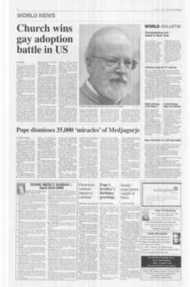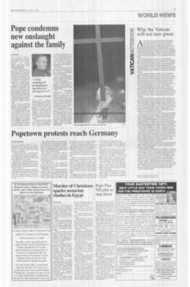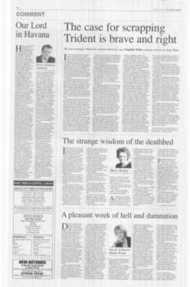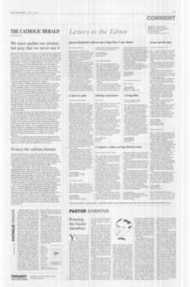Page 7, 21st April 2006
Page 7
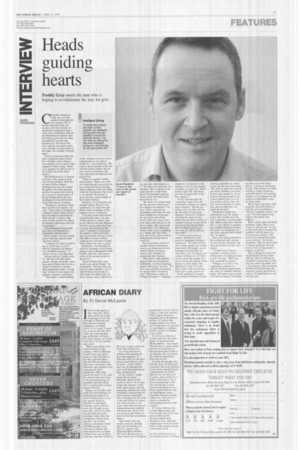
Report an error
Noticed an error on this page?If you've noticed an error in this article please click here to report it.
Tags
Share
Related articles
Red Nose Day Continues To Fund Abortion Groups
Medieval Mendicants Were Fat, Scientist Reveals
Yobs In A Land Of Peace And Prosperity
Mrs Gallagher: The Debate Goes On
'i Am A Rather Unsubtle Sort Of Chap'
Heads guiding hearts
Freddy Gray meets the man who is hoping to revolutionise the way we give Charitable donations today are a bit like medieval indulgences: one spends a bit of money and cleans the conscience. And big charities, to stretch the cotnparison somewhat, have similarities with the pre-Reformation Church: they are largely good, but too often corrupted by scandal and bureaucracy. The brave few who criticise charitable institutions, though not quite burnt at the stake, are certainly frowned upon.
Yet for a long time there has been a niggling unease about the voluntary sector. Donors increasingly want to know what happens to their money. There is an appetite for reform, but so far nobody has done much about it.
David Pitchford is a "frustrated donor" who wants to help sort out the problem. With this in mind, he has created Intelligent Giving, the United Kingdom's first free advisory service for people who wish to give money to good causes. If David Pitchford has his way, Intelligent Giving will revolutionise the nature of charity.
"People go a bit funny when they see the word charity," he says. "They think of charities as somehow otherworldly, almost beyond analysis and criticism. They are not. I want to chip away at that sacred cow aspect of charities. take away that veil of mystique."
The Intelligent Giving website, due to be launched in September, will provide a "charity picker" service to help donors find the charities that suit their criteria.
"I suppose the ideal would be for us to become a sort of Which? magazine for donors," says Pitchford uneasily, "of course, we are more than that."
Along with the "charity picker", the site will offer short, punchy articles about the voluntary sector. There will also be a forum for donors to discuss their experiences and a "watchdog" service to investigate allegations of charity malpractice.
"The public's understanding
of the voluntary sector is not as sophisticated as it could or should be," says Pitchford. "We want to attract people to the site with the charity picker, but we also want to hook them sideways into these thought-provoking articles.
"There is no public debate about charity. There is no website where people can just go on to a forum and discuss giving. That is amazing when you think what big, big business the sector is. Its annual UK income is more than the yearly budget of the United Nations."
Pitchford, 40, is likeable and straight-talking. He gives the impression of a man who gets things done, sometimes at the expense of tact or delicacy.
"I would accuse most donors of being pretty lazy," he says. "When giving to charity, they do not observe the due diligence that they would when they buy a toaster. Businesses are the same. Companies which keep the tightest control over business investments will give away £20, 000 to charity without stopping for a moment to think about where that sum is going."
Pitchford's own frustrations with the voluntary sector began during a trip to Bangladesh with Oxfam, when he came across some of the poorest people in the world.
"None of them had a bad word to say about Oxfam," he remembers. "But they did criticise two other charities, one of which I had given money to. This made me realise that you throw money away without hay ing any clue what happens to it." He refuses to.name the two charities. This is typical of his approach. He would rather point out charitable agencies which work well than attack those that do not.
"We want to be a little edgy, but the outcome will be positive about most charities." he says. "If we come across something awful then we will draw attention to it, because we are on the side of the donor. I am very aware, however, that a little bad press can have a ripple effect across the whole sector. Too often journalists come across something in a charity that they don't like, and write a piece without realising the damage that it could do."
He is extremely critical of another charity information service, an American website called Charity Navigator, which ranks charities by examining their finances.
"The point is that administration costs are all reported differently, you are comparing apples with pears," he says. "If you could quantify everything by money then it would be easy." He quotes a critic of Charity Navigator: "Judging a charity by its finances is like judging a wine by the number of grapes you put in it.' That's exactly right. We will never provide a league table of the best charities."
Yet he concedes that the "watchdog" part of his site could harm a charity by exposing its failures. "We are not setting out to do that, but we are not afraid of annoying charities. However, I think it will help the sector on the whole because there are lots of rumours buzzing around about charities doing things badly. Most of these rumours are false and we will be able to show that."
So how do you assess a charity? Pitchford is well aware of Intelligent Giving's limitations. "To really investigate a large charity you would need about 300 people, and at Intelligent Giving there are only three of us. I compare our work to looking at a car factory. You guess the quality of a car by seeing the quality of the factory in some detail. The likelihood is that if it looks like a really well-run factory, you'll get a really good car."
In his ambition to remain even-handed. Pitchford avoids making judgments on which causes are the most deserving. "We want to help each individual donor. Whether you want to give your money to cats or to poor starving people is of course entirely up to you. If you want to give to cats, we will say here are the cat charities, and we think this one might be the best."
Pitchford is bright and understands how the media works. For several years he was a journalist, working alternate shifts at the Times and the News of the World. "I used to get muddled between the two, and write racy headlines for the Times and get really ticked off," he laughs.
He is also well-qualified on the technology side, having worked for an e-business, setting up websitcs for big companies.
"I learnt how to knock together a website, with a strong focus on making it easy to use,'" he says. "But I am still a journalist at heart."
Perhaps as a result of his experience working at a tabloid. Pitchford appreciates the value of celebrity endorsement. He hopes to get several well-known figures, including the television chef Jamie Oliver, to promote Intelligent Giving. This reliance on celebculture is a little surprising given Pitchford's no-nonsense attitude to everything else. He seems too admirable to play the fame game.
Rut he has no problem with using the rich and famous to help the poor and helpless. "We are a populist vehicle," he says. "We will exploit every whim of the public that helps us."
With a little laugh, Pitchford adds that "sadly, there is no money in this for me". So far he has been able to finance his initiative with the help of a few generous backers. "We have a few commercial ideas up our sleeves," he reveals guardedly. "But we don't want to charge anything. We will have to rely on the people's largesse to get by."
This could prove tricky for the Intelligent Giving team: after all, they are relying on the public's generosity so that they can show the public how to be generous. But one senses that David Pitchford has the necessary charm and drive to carry it off. Intelligence is not his only gift.
blog comments powered by Disqus





